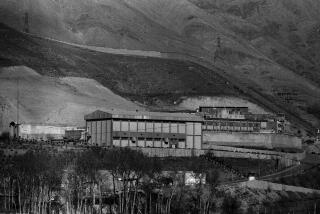U.S. Seeks Release of Ethnic Albanians, Peaceful Return of Serbs to Kosovo
PRISTINA, Yugoslavia — U.S. envoy James C. O’Brien on Saturday called for Yugoslavia’s new government to quickly release ethnic Albanian political prisoners held in Serbian jails and for the people of Kosovo to tolerate the return of former Serbian residents.
“Serbs who want to return home should now have the chance,” O’Brien, envoy to the Balkans, said at a news conference here. “It’s incumbent upon everyone in Kosovo to help create the conditions that will allow anyone who wants to live in Kosovo to live here safely and normally.”
O’Brien said he stressed the importance of a quick release of ethnic Albanian prisoners in talks Thursday with new Yugoslav President Vojislav Kostunica in Belgrade, the Yugoslav and Serbian capital.
Kostunica responded that “he would consider it,” but he stressed his own interest in enabling former Serbian residents to return to Kosovo, O’Brien said.
Kosovo is a province of Serbia, the larger of Yugoslavia’s two republics. Yugoslav troops were forced to withdraw from the province last year after the North Atlantic Treaty Organization carried out a 78-day air campaign to aid ethnic Albanians being oppressed by Serbs.
About 1,100 ethnic Albanians from Kosovo, many of them independence fighters captured by Yugoslav forces before and during the air war, remain imprisoned elsewhere in Serbia.
Ethnic Albanian leaders who met with O’Brien here Saturday stressed that release of the prisoners would create a better atmosphere for Serbs to live safely in Kosovo, the envoy said.
“It’s a very constant message from the Albanian political leaders, that if you release the detainees, you’ll improve the climate,” he said. “They’re not drawing a specific link. It’s not an exchange program.”
The United States is pressing hard for both sides to take these steps, he said.
Tens of thousands of Serbian residents of Kosovo fled after international peacekeeping forces entered the province in June 1999. Most left either alongside withdrawing troops and police or in subsequent weeks after a wave of revenge attacks on the remaining Serbs.
O’Brien implied that if ethnic Albanians--who make up about 95% of Kosovo’s roughly 1.6 million population--want the international community to support their aspirations for more autonomy, they must live peacefully with Serbs as neighbors.
“I think, as the world judges how Kosovo develops over the next several years, it will look not only to elections or to the way the government operates, it will look to the way that a real society is re-created, in which people are able to live where they want, move freely and have normal lives,” he said.
In speaking to Kostunica about the prisoners, “I made clear that it’s very important to the United States, to the region, to the families, and really to the foundation of the new democratic government in Belgrade that these people be released immediately,” O’Brien said.
Kostunica replied that, while he “respects this as an issue of basic human rights,” he also “believes that there needs to be a legal process for him to be able to release these people,” O’Brien said.
“He’s at the moment just the president of the federal government, without control over many of the ministries, without his own people in them, and without control over the Serbian ministry which has direct legal responsibility, and he’s working his way through those issues as part of the solution to this problem,” O’Brien said.
O’Brien expressed confidence that Kostunica will be able to exert his authority more forcefully in coming days, despite resistance from the supporters of former President Slobodan Milosevic.
The ex-president’s Socialist Party still controls the parliament and government of Serbia.
Control by Kostunica and his allies of federal and municipal revenue sources is one important means of “leverage,” O’Brien said, as is the “sunlight” of new information being made public about financial and other abuses committed by Milosevic and his supporters.
More to Read
Sign up for Essential California
The most important California stories and recommendations in your inbox every morning.
You may occasionally receive promotional content from the Los Angeles Times.










